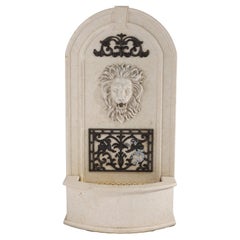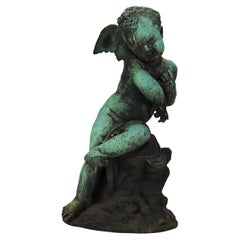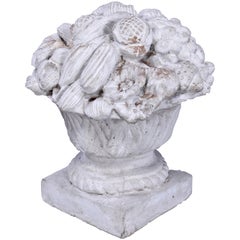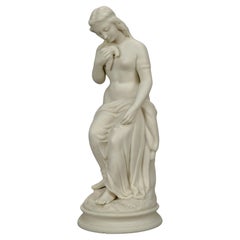Want more images or videos?
Request additional images or videos from the seller
1 of 10
Classical Bronzed Figural Sculpture Fountain Head, Cherub with Fish 20th Century
$2,500List Price
About the Item
- Dimensions:Height: 29 in (73.66 cm)Width: 18 in (45.72 cm)Depth: 15 in (38.1 cm)
- Style:Classical Greek (In the Style Of)
- Materials and Techniques:
- Place of Origin:
- Period:
- Date of Manufacture:20th Century
- Condition:Wear consistent with age and use. Overall very good condition with only minor finish loss and use related water marks.
- Seller Location:Big Flats, NY
- Reference Number:Seller: 674561stDibs: LU2396313268432
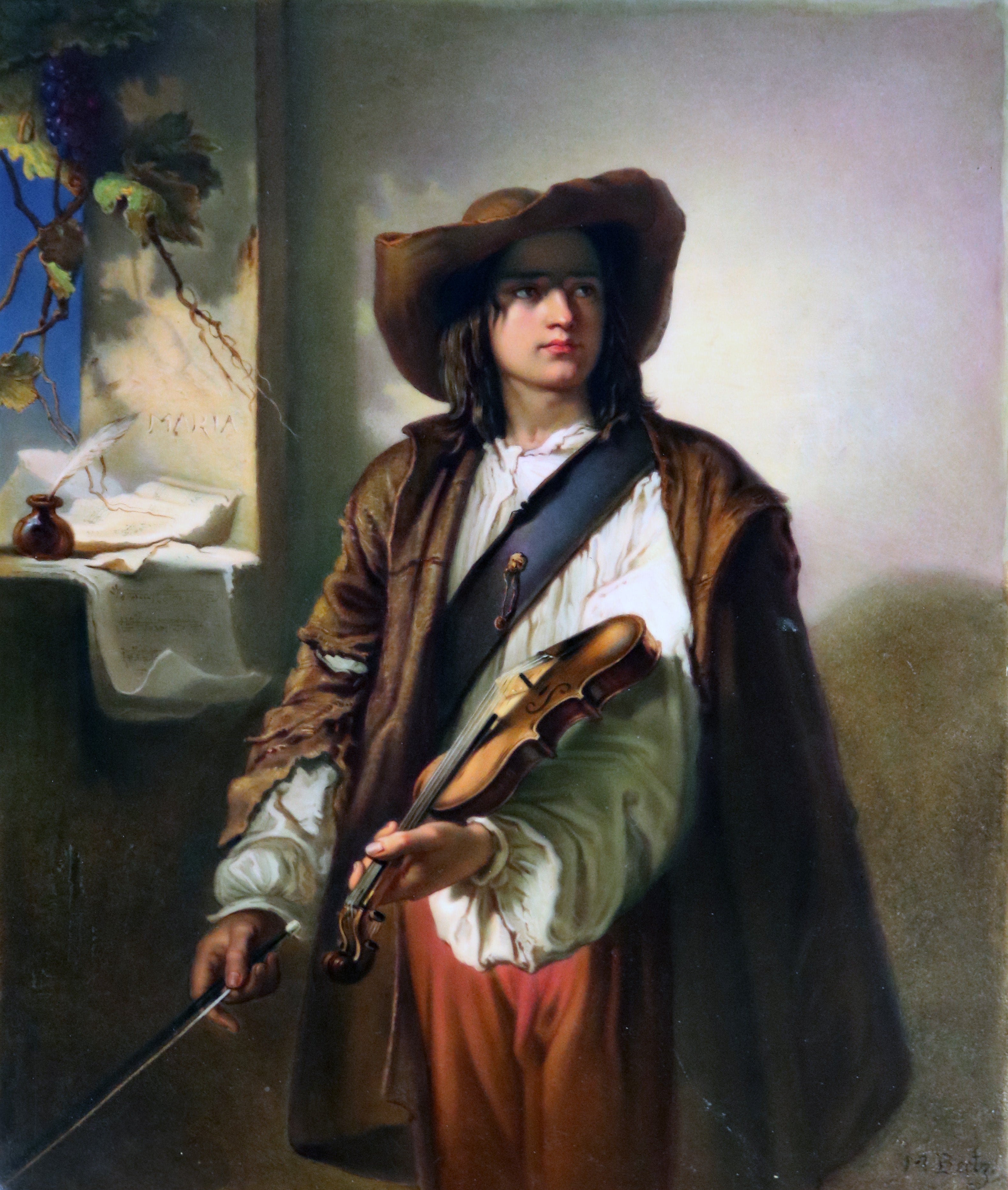
About the Seller
4.9
Platinum Seller
Premium sellers with a 4.7+ rating and 24-hour response times
1stDibs seller since 2016
2,780 sales on 1stDibs
Typical response time: 5 hours
Authenticity Guarantee
In the unlikely event there’s an issue with an item’s authenticity, contact us within 1 year for a full refund. DetailsMoney-Back Guarantee
If your item is not as described, is damaged in transit, or does not arrive, contact us within 7 days for a full refund. Details24-Hour Cancellation
You have a 24-hour grace period in which to reconsider your purchase, with no questions asked.Vetted Professional Sellers
Our world-class sellers must adhere to strict standards for service and quality, maintaining the integrity of our listings.Price-Match Guarantee
If you find that a seller listed the same item for a lower price elsewhere, we’ll match it.Trusted Global Delivery
Our best-in-class carrier network provides specialized shipping options worldwide, including custom delivery.You May Also Like
A French 19th-20th Century Carved White Marble Fountain Sculpture with Children
Located in Los Angeles, CA
A fine and charming French 19th-20th century carved white marble whimsical group sculpture depicting two putti (Children) playing with a dolphin, fitted for use as a fountain, Paris,...
Category
Antique Early 1900s French Louis XV Fountains
Materials
Marble
$9,985 Sale Price
20% Off
H 36.25 in W 21.25 in D 18 in
Whimsical English 19th-20th Century White Marble Figural Outdoor Dog Fountain
Located in Los Angeles, CA
A Whimsical English 19th-20th century white marble figural fountain with dogs fountain. The Baroque Revival six-sided tripod marble base surmounted with three upright seated Yorkshire Terriers resting on a leaf and acanthus center stem, topped with a semi-circular scalloped carved basin...
Category
Antique Early 1900s English Baroque Revival Fountains
Materials
Marble
$14,850
H 60.63 in W 30.5 in D 28.5 in
American Cast Bronze Garden Fountain with Figural Boy Holding Koi Fish. C. 1870
Located in Charleston, SC
American cast bronze garden fountain with standing figural boy holding Koi fish on a two-tiered shell form scrolled base with turtle at his feet, Late 19th century.
Category
Antique 1870s American American Empire Fountains
Materials
Bronze, Copper
$14,800
H 54.5 in W 28 in D 31 in
20th Century Italian Stone Fountain Mask
Located in Milano, MI
This antique stone mask was probably used in a fountain. It is a very decorative Italian antique object. The mask fits as decorative object on a bureau o...
Category
Early 20th Century European Classical Roman Animal Sculptures
Materials
Stone
Large Patinated Bronze Fountain with Heron Sculptures
Located in London, GB
This wonderful patinated bronze work is designed to function as both a water fountain and a superb piece of sculpture. The item will be well-suited to either an indoor or outdoor setting.
The piece takes the form of two herons...
Category
20th Century French Anglo-Japanese Fountains
Materials
Bronze
17th Century, Carrera Marble Lion Fountain Head
Located in Los Angeles, CA
Stunning, solid white, Carrara marble lions head from a fountain in Florence featuring a flowing main and a fabulous patina. Mounted on a custom, iron base. The piece hails from the ...
Category
Antique Early 1600s Italian Sculptures
Materials
Marble
Nude Male Bronze Sculpture Fountain
Located in Malibu, CA
Bronze male sculpture signed. Fonderia Giorgio Sommer Calabritto Napoli
Thomas, sculptor, lived and worked in the Naples area, and especially on Capri, from 1889 to 1906. Given this ...
Category
20th Century Italian Renaissance Figurative Sculptures
Materials
Carrara Marble, Bronze
A French 19th Century Carved Marble Whimsical Figural Urn Fountain with Children
By Joseph Reynés I Gurgui
Located in Los Angeles, CA
A very fine large, rare and charming, French, 19th century. Belle Époque carved white marble whimsical figural urn fountain depicting children climbing on an urn with flowers and garlands, influenced in the Louis XV style, by Joseph Reynés I Gurgui (Barcelona, 1850-1926). Signed: Reynes. Barcelona, circa 1890.
An almost identical Carrara marble fountain also by Josep Reynés carved in 1893 currently at the Parc de la Ciutadella in Barcelona, Spain.
Measures: Overall height: 55 inches (140 cm)
Marble height: 49 inches (124.5 cm)
width: 37 inches (94 cm)
depth: 30 inches (76.3 cm)
Joseph Reynes Gurguí (Barcelona, 1850 - 1926) is a Catalan sculptor, also known as Reynesy-Gurgui, Spanish school.
He studied at the Ecole de la Llotja, studied for a time in Paris, in the workshops of the great French sculptors Jean-Baptiste Carpeaux (1827-1875) and Carrier-Belleuse (1824-1887). He devoted himself mainly to interior decoration. His works were profoundly marked by a French influence. He exhibited in Paris in 1895 where he received an honorable mention. In 1890 he obtained the first medal in Madrid for "The Violinist".
Literature:
E. Benezit Dictionaire des Peintres, Sculpteurs, Dessinateurs et Graveurs by Grund - Nouvelle Edition, 1976 - Volume 8, Page 714.
Cristina Mensoza, Ramon Casas...
Category
Antique 19th Century Spanish Louis XV Fountains
Materials
Marble
$98,450 Sale Price
21% Off
H 55 in W 37 in D 30 in
Italian Ancient Marble Sculpture Fountain, Late 16th Century
Located in Milano, IT
Sea monster
Carrara marble mouth fountain
Italy, late 16th century
It measures 13.8 x 31.5 x 18.9 in (35 x 80 x 48 cm)
State of conservation: some small evident gaps and widespread signs of wear due to outdoor exposure. The gray marks crossing it do not come from restoration, but are rather the natural veins of the marble.
This work has some morphological characteristics typically associated with the iconography of the sea monster: an elongated muzzle, sharp teeth, protruding eyes, elongated ears, and a coiled serpent's tail.
An in-depth series of studies on artistic depictions of the sea monster attempted to verify how this symbol evolved in antiquity in the European and Mediterranean contexts and how it gradually changed its image and function over time. The iconography itself is mutable and imaginative and its history is rich with cultural and artistic exchange, as well as the overlapping of ideas. This occurred so much that it is difficult to accurately pinpoint the "types" that satisfactorily represent its various developments.
However, we can try to summarize the main figures, starting from the biblical Leviathan and the marine creature that swallowed Jonah (in the Christian version, this figure was to become a whale or a "big fish", the “ketos mega”, translation of the Hebrew “dag gadol”). Other specimens ranged from the dragons mentioned in the Iliad (which were winged and had legs) to "ketos” (also from Greek mythology), the terrifying being from whose Latinized name (“cetus”) derives the word "cetacean". See J. Boardman, “Very Like a Whale” - Classical Sea Monsters, in Monsters and Demons in the Ancient and Medieval Worlds, in Papers presented in Honor of Edith Porada, Mainz am Rhein 1987, pp. 73-84).
In Italy the monster underwent yet further variations: it can be found in Etruscan art on the front of some sarcophagi representing the companion of souls, while among the Romans we find the “Pistrice” (cited by Plinio in Naturalis Historia PLIN., Nat., II 9, 8 and by Virgilio in Eneide: VERG., Aen., III, 427), which appeared in the shape of a stylized hippocampus or a very large monstrous cetacean and evolved into a hideous being with a dragon's head and long webbed fins.
During the Middle Ages, the sea monster was the object of new transformations: at this time, it is often winged, the head is stretched like a crocodile, the front legs are often very sharp fins - sometimes real paws - until the image merges with dragons, the typical figures of medieval visionary spirituality widely found throughout Europe (on this topic and much more, see: Baltrušaitis, J., Il Medioevo fantastico. Antichità ed esotismi nell’arte gotica, Gli Adelphi 1997).
In Italy during the 15th and 16th centuries, the revival of classicism - representative of the humanistic and Renaissance periods - led to a different reading of these "creatures". Indeed, the sea monster was also to find widespread use as an isolated decorative motif, especially in numerous fountains and sculptures where dolphins or sea monsters were used as a characterizing element linked to water (on this theme see: Chet Van Duzer, Sea Monsters on Medieval and Renaissance Maps, London, The British library, 2013).
From the morphological point of view, the "sea monsters" of this period are mostly depicted as hybrid figures, in which the body of a mythological or real being (a hippocampus, a sea snake, a dolphin), is joined to a head with a rather indistinct appearance. It was usually characterized by large upright ears, an elongated snout, sharp teeth and globular, protruding eyes; a complex and indefinite figure, both from the symbolic point of view and from that of its genesis.
The work we are examining is placed as a cross between the medieval sea serpent and the Renaissance dolphin, with stylistic features which recall the snake as often used in heraldry (such as the "snake" depicted in the coat of arms of the Visconti - the lords and then dukes of Milan between 1277 and 1447 - and which, for some, may be derived from the representations of the “Pistrice” that swallowed Jonah).
In the search for sources, Renaissance cartography and in particular woodcuts should not be neglected. See for example the monsters of Olaus Magnus, from the editions of the “Historia de gentibus septentrionalibus” (“History of the peoples of the north”) and the natural histories of Conrad Gesner, Ulisse...
Category
Antique 16th Century Italian Renaissance Animal Sculptures
Materials
Carrara Marble
Italian 19th Century Carved Carrara Marble Figural Fountain Jardinière Planter
By Giovanni Battista Lombardi
Located in Los Angeles, CA
A very fine Italian 19th century carved Carrara marble figural fountain "Jardinière" modelled as a standing Putto and a Satyr supporting a sea-sh...
Category
Antique 19th Century Italian Baroque Figurative Sculptures
Materials
Carrara Marble
$28,950 Sale Price
35% Off
H 50.5 in W 31 in D 26 in
More From This Seller
View AllVintage Travertine Composite Classical Figural Lion Wall Fountain 20thC
Located in Big Flats, NY
Vintage Travertine Composite Classical Figural Lion Wall Fountain 20thC
Measures - 69" x 35 1/2" x 18"
A vintage wall fountain crafted from composit...
Category
20th Century Fountains
Materials
Composition
Antique Classical Verdigris Bronze Cherub Fountain Figure 19thC
Located in Big Flats, NY
Antique Classical Verdigris Bronze Cherub Fountain Figure 19thC
(19 3/4 h x 10 3/4w x 10 1/4 d).
A 19th-century Verdigris bronze fountain figure depicting a cherub. This classic...
Category
Antique 19th Century Garden Ornaments
Materials
Bronze
$1,160 Sale Price
20% Off
French Classical Cast Hard Stone Panier de Fruits Garden Ornament, 20th C
Located in Big Flats, NY
A French Classical garden ornament offers cast hard stone statue depicting Panier de Fruits (Basket of Fruit), 20th century
$200-$500
A beautifully crafted 20th-century garden ornam...
Category
20th Century European Classical Greek Garden Ornaments
Materials
Stone
$440 Sale Price
20% Off
Antique Parian Sculpture of a Seated Classical Woman & Dove 19th C
Located in Big Flats, NY
An antique parian porcelain statue offers portrait of a seated Classical woman and a dove, 19th century
Measures- 11''H x 4.25''W x 4.25''D.
A finely c...
Category
Antique 19th Century Classical Greek Figurative Sculptures
Materials
Porcelain
$396 Sale Price
20% Off
French Empire Figural Bronzed Metal & Glass Center Table with Ram's Heads 20th C
Located in Big Flats, NY
A French Empire figural center table offers glass top over cast and bronzed base in triangular form having reeded legs with rams head capitals and hoof feet, stretchers with crossed ...
Category
20th Century Empire Center Tables
Materials
Metal
$1,480 Sale Price
20% Off
Pair of Antique Clodion Bronze Cherub Musician Sculptures Signed C1880
Located in Big Flats, NY
Pair of Antique Clodion Bronze Cherub Musician Sculptures Signed C1880
Measures - 13.5"H x 5.25"W x 5.25"D
Category
Antique 19th Century Figurative Sculptures
Materials
Bronze
$2,360 Sale Price / set
20% Off
Recently Viewed
View AllMore Ways To Browse
Cherub Cast Bronze
Cast Bronze Fountain
Cherub Fountains
Fish Fountain
Greek Bronze Figure
Bronze Head Classical
Greek Sculpture Heads
Cherub Fish
Cherub Bronze Fountain
Metal Garden Sculptures
Cherub Metal Cast
Fountain Head Bronze
Garden Fish Sculptures
Antique Basin
Antique Basins
Used Garden Fountains
Antique Garden Fountains
Water Fountain
